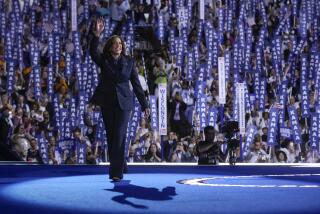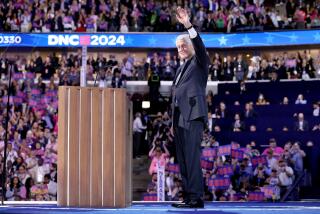COLUMN LEFT/ RICHARD N. GOODWIN : The Course Is Set; Will We Respond? : Clintonâs inaugural words challenge us to a partnership of healing.
âTo everything there is a season.â And without fail there will be a season to make critical, even harsh judgments on the acts and policies of President William Jefferson Clinton.
But not today. For in his inaugural, Clinton met the first test of his presidency with dignity and understanding.
An inaugural address, like most political speeches, is not a literary composition but an event. It is not designed for inclusion in anthologies, but to accomplish a fairly immediate purpose. There are some exceptions, of course, when a particularly felicitous turn of phrase seems to synthesize the demands of the moment. But they are rare.
Clintonâs purpose was to confirm Americansâ somewhat shaky belief in his personal determination to transform and restore a troubled country, while enlisting the energies of the people in this effort. These interdependent themes stated a course for the country, and one consistent with the oldest tradition of America.
Commentators were quick to seek parallels between Clintonâs rhetoric and that of John F. Kennedy. But the true paradigm of Clintonâs philosophy is not Kennedy, but that of Clintonâs namesake. âEach generation,â Thomas Jefferson wrote, âis as independent of the one preceding as that was of all which had gone before. It has, like them, a right to choose for itself the form of government it believes most promotive of its own happiness.â
The themes of change and renewal--essential to preserve fixed principles through changing times--turn through all of Jeffersonâs writings. Even amid his greatest triumphs, Jefferson foresaw that new conditions would require sometimes drastic alterations in the structure of government and in the relation between the people and government that his generation had so brilliantly conceived.
Change was necessary, as Clinton said, ânot for the sake of change,â but to preserve the formative principles of democracy--to ensure each individual the inalienable rights to life, liberty and pursuit of happiness. We would need âto reinvent Americaâ in order to preserve it and keep it on its upward journey. Thus the word change, which had become virtually a cliche throughout the campaign, was finally given a thematic content--general in nature, somewhat ambiguous, but a statement of principle, not simply a catchword from some issue poll.
Embedded in Clintonâs Jeffersonian belief were heartening references to the direction of envisioned change. For the first time amid the confusion of the transition, references were made to goals of concern not just to economists and Wall Street analysts, but to the mass of Americans. The new President noted the need of increased economic justice, which means, if it means anything, a fairer distribution of income and opportunity. He referred to the spreading poverty among Americaâs children and the increasing violence in our city streets. He stood on the steps of the Capitol, rapidly becoming the homestead of corruption and self-serving mediocrity, and spoke of the need to take government back from the power-brokers.
The references were necessarily brief and incomplete, but they carried overtones of a âliberalâ agenda, one directed at improving the quality of life for every American, including those who are now voiceless, impotent and stripped of the chance to advance their station in life.
This may be wishful thinking on my part, but the sentences were Clintonâs and he sounded as though he meant them.
âSome people want power for the sake of power,â Lyndon Johnson once said, âand some people want power for money. But I want power to use it.â Johnson, in those hope-filled days of the Great Society, before dreams were swallowed up in battle, meant that he intended to use the power of office on behalf the oppressed and disadvantaged while enhancing the possibilities of life for all citizens.
And Bill Clinton, now that the necessary equivocations of seeking office were behind him, sounded very much as if he, too, had been liberated to heal the scars of this divided land and the growing multitude of distressed who inhabit it.
I may be wrong about this; perhaps I, like many Americans, was swept up in the profoundly American sentiment of this day of democratic renewal. I hope not. Cynicism is not a comfortable emotion, nor one congenial to the American temperament. Given a choice, most of us would prefer to be idealists. The new President, like some before him, has called upon this brighter side of the American character. The country will respond, as it has before, if this Presidentâs words are matched by deeds.
More to Read
Sign up for our Book Club newsletter
Get the latest news, events and more from the Los Angeles Times Book Club, and help us get L.A. reading and talking.
You may occasionally receive promotional content from the Los Angeles Times.








